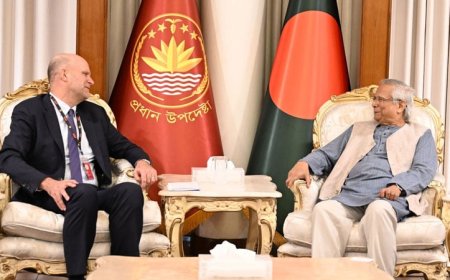"Bangladesh’s Corporate Sector Poised for Global Competitiveness"
Sara Zaker Talks Bangladesh’s Corporate Landscape and Asiatic 3sixty Controversies in Exclusive Interview

Sara Zaker: “To Succeed in Business, You Must Be Consistent, Relevant, and Purpose-Driven”
Renowned cultural figure, communications specialist, and entrepreneur Sara Zaker speaks to the Dhaka Tribune about the evolution of Bangladesh’s corporate sector, challenges faced by Asiatic 3sixty, and the need for strategic alignment between corporate innovation and regulatory fairness.
Dhaka Tribune: You’ve had a long journey in the corporate world. In the context of Bangladesh, what key qualities must an entrepreneur possess to be successful?
Sara Zaker: Asiatic’s journey into entrepreneurship began when we saw a need for data-backed decision-making. That led to the creation of the Market Research Consultants of Bangladesh in 1981, where I joined in 1985.
For any entrepreneur in Bangladesh, it's essential to grasp the country’s distinct socio-economic environment. But more than anything, you need resilience and commitment to your vision. Success in business doesn’t come from chasing trends—it comes from consistency, relevance, and clear goals. Long ago, we realized that relying on instinct wasn’t enough. That’s why we built specialized business units like Mindshare for media services, Asiatic Exp for events and activations, and Forethought PR—each designed to enhance the quality and scope of our services.

Based on your experience, how would you assess the current state of Bangladesh’s corporate sector?
The sector is undergoing rapid change, propelled by digitalization, demographic shifts, economic reforms, and global market integration. I believe that with the right regulatory framework and support, Bangladesh’s corporate sector has the potential to compete globally.
As the head of a prominent business group, how do you approach leadership, talent development, and overcoming operational challenges?
In the service sector, institutional success hinges on empowering capable and committed leaders. Our work is deeply people-dependent. We focus on recognizing individuals who are eager to learn and dedicated to their responsibilities. At Asiatic, we’ve always prioritized building a company rooted in values, people, purpose, and legacy. This philosophy was championed by our late Chairman, Aly Zaker, and it continues to guide us.
There have been recent developments involving frozen accounts of Asiatic 3sixty. Could you share the latest updates?
Some relief has come—certain payments have been unfrozen, allowing us to meet essential obligations like salaries and taxes, and make limited third-party payments. However, even partial unfreezing has serious repercussions. It risks causing operational paralysis, undermines client commitments, disrupts vendor payments, and jeopardizes jobs and livelihoods. It could also lead to loan defaults and tax revenue losses for the government. We strongly urge the NBR-CIC to fully unfreeze all Asiatic Group accounts so we can resume full operations and protect our stakeholders.
As a communication agency serving both local and international clients, how do you balance market demands with regulatory constraints?
Before the account freezing, we enjoyed the trust of all our clients, both domestic and global. That trust took years to build. Unfortunately, these recent actions have shaken our clients' confidence and may affect our business. Let me emphasize—Asiatic has always maintained transparency and compliance in its operations. We believe a clear and consistent regulatory environment is key to preserving trust in the communication ecosystem.
How many people are currently involved with Asiatic, and what kind of support do you offer to the media?
Across the Asiatic Group, we have around 800 full-time employees and approximately 3,000 contractual workers, including brand promoters and sales representatives. As Bangladesh’s largest media-buying agency, we work closely with media outlets to align brand messaging with content, maximizing impact. We offer our media partners extensive support, though we’ve never interfered in editorial or programming decisions. A strong media landscape is essential for effective brand communication.
How would you describe Asiatic’s evolution as a business group?
Over the past 56 years, we’ve grown from a single advertising agency into a multidisciplinary communications group. This transformation happened because we recognized the need for specialized services. Under Aly Zaker’s leadership, each emerging need was met with a dedicated company—be it for production, PR, events, or media. Our growth model has always centered on investing in talent and service quality, which has allowed us to remain competitive over the long term.
There are occasional claims about monopolistic tendencies in the communications industry. How do you respond?
These claims are overstated. Except for media services, none of our verticals hold more than a 10% market share. Even our media service agencies have less than a 60% share, which is consistent with industry norms in comparable markets like Pakistan and China. Scale allows us to invest in better tools, talent, and data—benefiting our clients. Our focus has always been on building capacity and improving quality. Other industry players can follow this approach by investing in human resources and robust strategic planning tools. We’ve long advocated for better access to media data, and we hope policymakers will support this.
What does an ideal relationship between the corporate sector and the government look like? And how does Asiatic contribute to the national economy?
A healthy corporate-government relationship is based on fairness and merit. No company should win contracts through favoritism. Results speak louder than influence—if you don’t deliver, no amount of favoritism will help.
Asiatic Group contributes around Tk 170 crore in VAT and taxes annually. That’s a significant commitment, and we hope for a policy environment that enables compliant businesses to thrive.
Young people have become a powerful force for change in Bangladesh. How should the corporate sector respond to the aspirations of Gen Z?
Gen Z thinks differently, and we need to understand their worldview. If we want to remain relevant, we must evolve. As the saying goes, “To change the world, you must first change yourself.” Gen Z will shape the future of society and business, so we must center their needs and perspectives in our thinking and planning. That’s the only way forward.
What's Your Reaction?





















































































